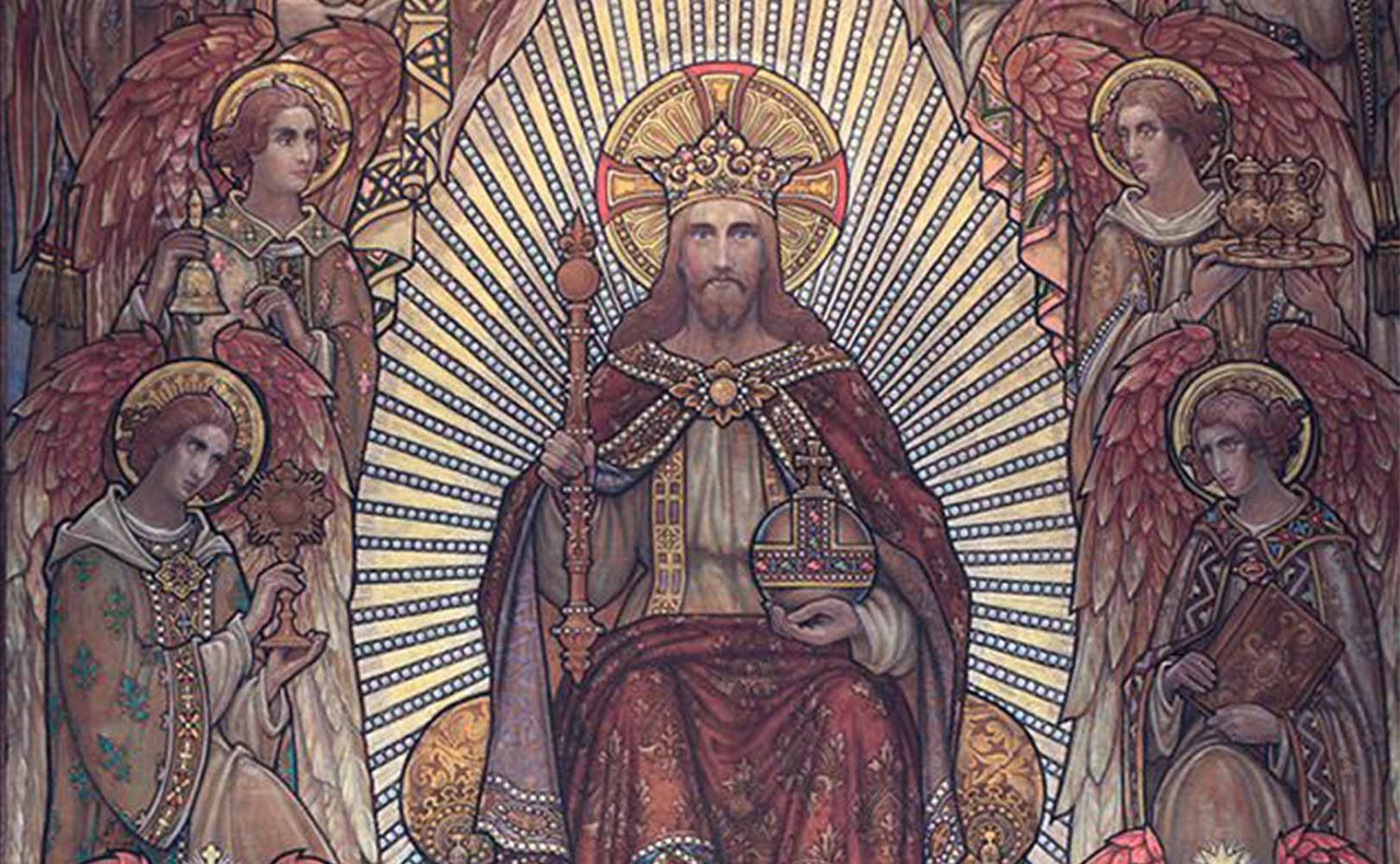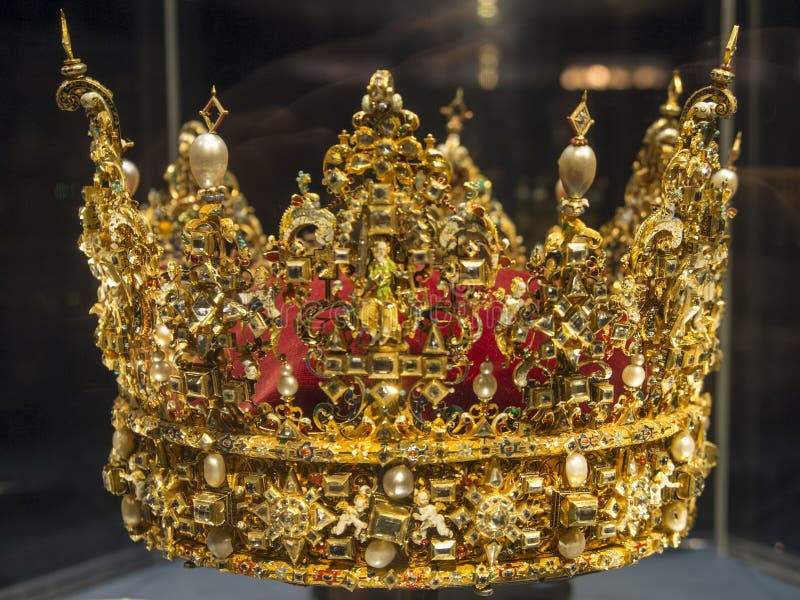Can we all just admit it? The chief disadvantage of living in the “greatest nation on God’s green earth” is that we Americans find it just a little tougher to sympathize with and even celebrate Monarchy.
I mean, wouldn’t we rather celebrate “Christ the President of the Universe?” This idea of Christ as the king is practically a frontal assault on all of our inclinations as patriotic Americans!

In other words, if we all know that the democratic-republican form of government under which we live is the most suitable government for mankind, doesn’t this realization dampen our enthusiasm a wee bit for celebrating monarchy and kingship- and therefore, all that is entailed by the theme of the last Sunday of the liturgical year?
The fact that Pope Pius XI added this feast to the Roman calendar fairly recently (1925) makes me think that he knew it would come as a little bit of a shock to free-thinking and independent Americans. I am sure he meant to give a slap in the face to the rising and militant secularism of the time – and certainly, he was thinking about the aggressive and violent assault on religious liberty in Mexico. Is there a greater antithesis to the mind of the secularist than the concept of Christ as the king of the universe?

As a High-School teacher, it often befalls my lot to read Herodotus,’ The Histories, his legendary and not so succinct account of the “Persian War.” Herodotus details the rise and “worldwide” dominance of Persia until it was thwarted in its inexorable western expansion by a relatively small group of democratic free-thinking Greeks, at such places as Marathon and Thermopylae.
If there is a lesson to be learned from Herodotus, it is certainly this: As mighty as the Persian monarchs were, as massive as their armies grew, as multitudinous as were their servile and oftentimes sycophantic minions, they were nonetheless no match for the wits and bravery of a free-thinking democratic people. For heaven’s sake, Athens was the very cradle of democracy and yet according to Herodotus, Athens very nearly single-handedly put a stop to the seemingly all-powerful and haughty King Xerxes!

One cannot read Herodotus without feeling a twitch of exultation about the wit and resourcefulness and spunk that seems to arise when men think for themselves and agree by mutual compact to band together in a great cause. One cannot refrain from thinking that there is something beautiful about men who rule themselves democratically!
And so how is an American Catholic supposed to feel this Sunday? The very fabric of our society, our notions of law and reason and science and culture were bequeathed to us by the Greeks. Americans pride themselves on self-direction. If I remember correctly our War of Independence was directed against overthrowing the rule of a monarch.

And although the French were exceedingly helpful to us in our efforts, we have never been quite comfortable with them either for all of their aristocratic leanings. Many Americans like Thomas Jefferson were at first quite sympathetic about the overthrow of the Catholic monarchy in France during their so-called “Revolution.”
But again here we are, patriotic Americans confronted with celebrating the very thing, the defeat of which, provided a foundation for the American Republic- Monarchy!
As a church organist and the “official four hymn selector” for my parish, I will choose the following hymns:
- Alleluia Sing To Jesus, His The Scepter His The Throne!
- Crown Him With Many Crowns!
- The King of Love My Shepherd Is.
- To Jesus Christ Our Sovereign King.
I like these hymns and given the fact that I am not singing the “Gregorian Propers” as I think I should be, these hymns are the next best thing. But notice the unfamiliar-to-Americans trappings of monarchy!
We have sceptres!
And (gasp!) Crowns!

And thrones!

Oh the horror! How can Catholics celebrate such things if Monarchy is an unsuitable form of government?
I wonder if many Christians simply take in “Christ the King of the Universe” Sunday like many other things that the Faith proposes. After all the Church proposes all sorts of things for our belief which are simply not consonant with sound science and ordinary reason. So it’s perhaps best not to think about such things.
As if to say, perhaps there is a very real divide between faith and reason. When one goes to church or to worship, it is best to simply hang up one’s coat and hat and intellect on the rack outside the church to be donned only upon exit.

Could it be that Kingship or Monarchy is indeed the fitting rule for mankind? This is not to say that this or that specific group of humanity should adopt a monarchical form of rule immediately. This is not to say that the American representative form of government by which we govern ourselves is not, in fact, the very best form of government available to us right now on our own time and place. Perhaps that form of rule is best relative to the manners customs and mores of this or that people.
But if one had to choose the form of government that is simply best without qualification, what would one choose? What form of government did God Himself choose to rule his universe? Did he choose the best government? Is it relevant to our eternal happiness that He is a monarch? I guess the answer is obvious.
It is a fundamental rule of Christian living that the habits and affections that we develop on earth are significant in disposing our hearts towards heaven. As St. Thomas Aquinas was fond of saying “Grace perfects nature.” We are disposed towards the things of grace by the things of nature. Faith and reason are not opposed but rather the more we strive to reason aright, the more we provide an intellectual disposition for the gift of God’s grace.
That Christ is a monarch is a significant part of our faith. Insofar as we might identify various Christian monarchs that did not overstep their authority or abuse their power, perhaps every Christian might gather some lessons concerning how we ought to think, behave and feel in the presence of a monarch? Perhaps there are minor and major points of reverence and courtly behavior that are lost on the disciples of Democracy? Most importantly, perhaps there is a lesson to be learned about humbly and immediately adapting our will to that of his sovereign majesty, Christ the King; deference to a king is something a little more difficult for we rugged American individualists, who are accustomed to think it always right to have a say in our own affairs.
Notwithstanding any obstacles in our path ascribable to our own political custom, I suspect that our celebration of Christ The King of the Universe this weekend will strike most Christians with the fitting annual realization that “Yes! Christ is the King! Christ should be enthroned in the very center and principal place in our hearts. Every Christian will undoubtedly be struck with the fitting thought that inasmuch as we have earthly concerns and earthly rulers, nonetheless Christ is ultimately in charge and we are to do nothing except it be his will!
Viva Christo Rey!






I loved this post! I’ve had a hard time knowing how to celebrate- even meditate on Christ as King. I found the second to last paragraph especially intriguing.
Thanks Sarah! I think a good example of how celebrating Christ the King is a little for many Catholic Americans- or rather American Catholics 🙂 is the difficulty that many have with the traditional and rather ornate clerical “garb” that priests wear. When I go to an ordinary mainstream Catholic church, there appears to be an almost studied avoidance of symbols of pomp or any sort of regality. Or perhaps a better example, is the discomfort that we apparently feel in adopting a strictly formal behavior at Church. Or perhaps we can see this in the casual liturgical music…
I think the kingship of God is a very different thing than human monarchy. In my class, we have just gone from studying King Arthur to studying Robin Hood. How did we go from reflecting on the ideal king in an ideal Britain, to a story in which the highwayman is the hero? Simple. Bad kingship. King John allowed all kinds of abuse of the people, of which execution for poaching a single deer from Sherwood forest was just the most well publicized. Humanity is fallible, therefore the divine right of kings eventually becomes problematic.
Years ago when my husband and I were young parents in a Catholic home school group we came up against the idea of the Ultra Montane Catholics. These were those who believed the world would be best governed by the Church, ultimately by the Pope. At first puzzled and troubled by the idea — which no one openly in the group openly advocated, but which some were in sympathy with — we decided we had to reject it, even though by doing so we had to reject the idea that the Catholic Church ultimately would have the most perfect and fit government, which seemed to some like it conflicted with the Office of the Keys. We reasoned that the Office of the Keys referred to forgiveness of sins, not to worldly governance.
To sum up, Christ’s monarchy is absolute, but I still believe a democratic government is, in general, a more refined and reliable form of government than regency — depending always on whom the people in leadership actually are.
Hi Susan,
Thanks for your comment. At our little school, the juniors and seniors have to write a “thesis” each year that they read in front of the school community and then defend. (N.B. With copious help- and ordinarily in front of a fairly supportive audience-just so that the trauma is not too overwhelming 🙂
But this topic is always a popular one- “Whether Democracy is the best form of government?” or “whether monarchy is etc.” So it does seem like a perennial topic!
Nonetheless, I think I agree with you that the Democratic Republic that we live is probably the government most fitting for Americans- and I certainly feel pretty good about it as well! 🙂
But despite my own personal preference for the “rule of many” so to speak, I am reminded that Philosophers from Plato to Aristotle to St Thomas Aquinas all seem to agree that Monarchy is the best form of government (simply speaking— that is to say that in itself it appears to be the best, but because of circumstances/ deficiencies in this or that populace, the best form of government might not be the best for “this particular group of people” ) (For example- take a glance at chapter 2 and 3 from this http://dhspriory.org/thomas/DeRegno.htm#2 )
I’m writing in the car on the cell phone and am down to 11 percent so this will have to be short. Thomas’ argument in the third chapter you provided suggests that the chief aim of a ruler of a city is necessarily going to be to preserve peace *and* he says a group of people cannot make peace as effectively as a single leader. Thomas did not have the benefit of the knowledge of the history of the 20th century. We now know that a single dictatorial leader is a great cause of lack of peace and war. However St Thomas should have known that a single leader would not lead to peace after all we have the ancient history of Darius iii and the pharaoh of Egypt etc.
My blog about Classical Education is http://www.classicaleducationtoday.com. It’s more about instructional effectiveness than philosophy.
Thanks so much for sharing the link to your blog! I am enjoying it already!
While I think you are right in some respects, allow me to suggest a few counterpoints.
Aristotle thinks that monarchy is only appropriate when some person is of a different order of virtue than the people (perhaps the philosopher). Otherwise, considerations of justice, affection, virtue and governance lead to a republican form of government in which all citizens have a role in governing and being governed:
http://www.artsofliberty.org/the-blessings-of-liberty-reminders-from-aristotle-and-livy-for-our-troubled-times/
Though St. Thomas simply argues for the superiority of monarchy in On Kingship, in the Summa quotes Augustine favorably when he says that a good people should be allowed to create magistrates for themselves. Only when the people becomes corrupt should that be taken away from them. (Summa, 1-2.97.1. See also 105.1.)
According to Tocqueville, American Catholics have no trouble worshiping Christ as King, because this guarantees that their rights are grounded in divine not human law, and emphasizes how no mere man can rightly claim divine rule. This attitude is expressed in a recent National Review article: http://www.nationalreview.com/article/453333/christ-king-catholic-churchs-alternative-secular-tyrants
Thanks very much for the “counterpoints” Andrew. I especially like your point about Toqueville- with regard to our rights being grounded in divine law.
But darn! I have not taken a look at the other Thomas references in the Summa. But it does bug me that he can’t just write once on a subject in a black and white view manner for simpletons like me! 🙂
Pingback: Christ: Your Mediating and Conquering King - Jack Kilcrease